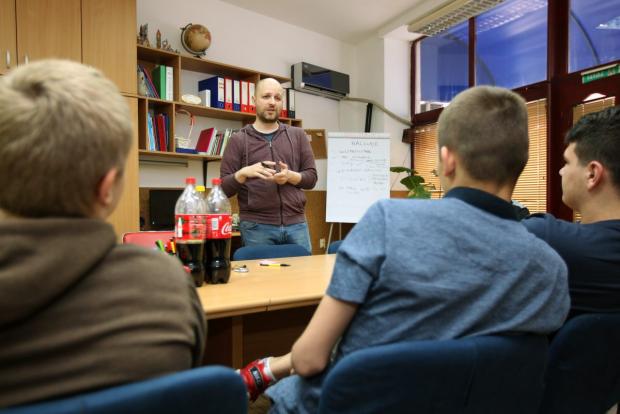A New Start for Vulnerable Youth in Novi Pazar
Novi Pazar is the second municipality in Serbia to open a Socio-rehabilitation Youth Club for the support of youth at risk and in conflict with the law. Now youth at risk have the opportunity to receive the support they need to get a new start in life. Young people who have committed crimes or display various violent and antisocial behaviours, including drug and alcohol abuse, or experienced family violence, have the opportunity to receive counselling, education and professional training. The aim of the service is also to strengthen their capacity to cope with different safety challenges and risks they encounter in their everyday life.
Experts from Serbia’s first Socio-rehabilitation Youth Club, which has been operating successfully in Požarevac for the past ten years, are ensuring that the Novi Pazar club gets off to a running start. This new service has been launched thanks to a partnership between civil society and government, supported by the OSCE Mission to Serbia and the Government of Sweden.
A civil society initiative
A strong belief that preventive educational measures are much more beneficial for juvenile perpetrators than punishment was the driving force that led Chance, a local civil society organization, to open the Socio-rehabilitation Youth Club in Požarevac in 2009.
Counselling and training help youth to re-integrate into society, thus preventing their alienation and isolation.
Biljana Ignjatovic President of Chance’s Board of Directors
One of the first challenges the Požarevac Youth Club took on was to work with a group of minors who had taken part in a mass fight which had resulted in the death of one youngster. After one year of individual and group therapy at the Socio-rehabilitation Club, the young people who were not directly responsible for the death of the youngster managed to work through their trauma and overcome their feelings of guilt.

Many other young people who were referred to the club for violent and deviant behaviour, or for socialization difficulties, including as a result of being victims of human trafficking, managed to overcome their problems thanks to the quality support of the Club’s experts.
After a few years the city of Požarevac recognized the importance of this service and decided to finance it from the local budget.

Ten years later, the good practices from Požarevac are being transferred to Novi Pazar, a city which, according to Adnan Dizdarevic, Director of the Centre for Social Welfare, “struggles with the problem of juvenile delinquency”.
Transferring best practices
The establishment of the Socio-rehabilitation Youth Club in Novi Pazar is a joint project of Chance, local Association of Psychologists , the Centres for Social Welfare in Požarevac and Novi Pazar and the local self-governments in the two municipalities. The start of this fruitful co-operation is supported by the OSCE Mission to Serbia in cooperation with the Swedish International Development Agency, along with a British Embassy supported initiative to further advance the pilot stage.
Adnan Dizdarevic and Tatjana Rajic, the Directors of the Centres for Social Welfare in Novi Pazar and Požarevac, respectively, are enthusiastic about the transfer of best practices.
The transfer has included training of experts, assistance in the adoption of necessary regulations and transfer of the methodology and supervision of the service itself.
Tatjana Rajic Director of the Centres for Social Welfare in Novi Pazar
In addition to the launch of the new Socio-rehabilitation Youth Club, 40 workshops have been held for 350 high school students addressing issues such as safe use of the internet and social networks, safety measures in emergency situations and traffic, healthy lifestyles, problems of violence, drug and alcohol abuse, firearm violence. A network of trained peer teams will continue working on strengthening the security culture of high school students in Požarevac and Kostolac.
Long-term sustainability
To ensure the sustainability of the Socio-rehabilitation Youth Club following the pilot stage, in Spring of 2019, the Novi Pazar Assembly adopted a decision to include the Club as a regular service, following the model established in Požarevac, to be financed by the City budget.
In the long term, Chance plans to continue transferring know-how related to the clubs so as to introduce them to other local communities. They are a shining example of how civil society can contribute to the development of public policies and practices on the local level. They also confirm how meaningful support to small-scale projects can be for its ultimate beneficiaries, in this case the young citizens of Serbia.

